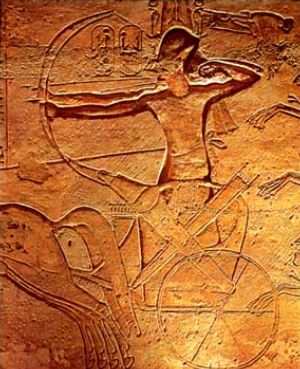
The Best Global Warming Videos on the Internet |
Posted on 09/15/2008 4:21:39 PM PDT by Fred Nerks
When Paul C. Sereno went hunting for dinosaur bones in the Sahara, his career took a sharp turn from paleontology to archaeology. The expedition found what has proved to be the largest known graveyard of Stone Age people who lived there when the desert was green.
The first traces of pottery, stone tools and human skeletons were discovered eight years ago at a site in the southern Sahara, in Niger. After preliminary research, Dr. Sereno, a University of Chicago scientist who had previously uncovered remains of the dinosaur Nigersaurus there, organized an international team of archaeologists to investigate what had been a lakeside hunting and fishing settlement for the better part of 5,000 years, originating some 10,000 years ago.
In its first comprehensive report, published Thursday, the team described finding about 200 graves belonging to two successive populations.
~snip
The most poignant scene was the triple burial of a petite woman lying on her side, facing two young children. The slender arms of the children reached out to the woman in an everlasting embrace. Pollen indicated that flowers had decorated the grave.
The sun-baked dunes at the site, known as Gobero, preserve the earliest and largest Stone Age cemetery in the Sahara, Dr. Sereno’s group reported in the online journal PLoS One. The findings, they wrote, open “a new window on the funerary practices, distinctive skeletal anatomy, health and diet of early hunter-fisher-gatherers, who expanded into the Sahara when climatic conditions were favorable.”
The research was also described at a news conference on Thursday in Washington at the National Geographic Society...
~snip
Other scientists said the discovery appeared to provide spectacular evidence that nothing, not even the arid expanse of the Sahara, was changeless. About 100 million years ago, this land was forested and occupied by dinosaurs and enormous crocodiles...
(Excerpt) Read more at nytimes.com ...
You might try entering “rivers in the sahara pictures images” in google. There are a few there.

The Best Global Warming Videos on the Internet |
About 68% of Europeans have DNA haplogroups that are from the Iberian Ice Age Refuge, yDNA = R1b and mtDNA = 'H'.
I think it is informative to note the haplogroups amoung the Guanches of the Canary Islands. When the Ice Age began to end, the refugees migrated all over Europe and at the same time into Northern Africa.
My guess is that at one time, Northern Africa was probably inhabited by White people who mixed with Black Africans became Berbers and etc.
"The Guanches are the mysterious natives of the Canary Islands. They were conquered by the Spaniards during the turn of the 15th century. Tall, blond and blue-eyed, the Guanches have long intrigued the anthropologists, for blond natives are rarity. According to the reliable Encyclopedia Britannica, the Guanches "are thought to have been of Cro-Magnon origin... and had a brown complexion, blue or gray eyes, and blondish hair."
You and I will be in that book soon enough..lol
In my family we still have the brow ridges and the extended sternums.
There’s a lot of variability in the living human family that can’t be shown with a handful of specimens.
But I think the Geiko caveman jokes are funny. ;)
that (four horse?) chariot rock art piece makes one wonder what the actual age of such rock art happens to be. :’) Great find!
Nah! The coming Ice Age will save us.
http://www.metmuseum.org/toah/hd/tass/hd_tass.htm
...Tassili-n-Ajjer in Algeria is one of the most famous North African sites of rock painting. Its imagery documents a verdant Sahara teeming with life that stands in stark contrast to the arid desert the region has since become. Tassili paintings and engravings, like those of other rock art areas in the Sahara, are commonly divided into at least four chronological periods based on style and content. These are: an archaic tradition depicting wild animals whose antiquity is unknown but certainly goes back well before 4500 B.C.; a so-called bovidian tradition, which corresponds to the arrival of cattle in North Africa between 4500 and 4000 B.C.; a “horse” tradition, which corresponds to the appearance of horses in the North African archaeological record from about 2000 B.C. onward; ...
http://www.metrum.org/mapping/sahara.htm
...Our knowledge of the ancient Sahara was revolutionized by the publication, in 1957, or the results of Henri Lhote’s investigations of the rock paintings of the central Sahara. These paintings indicate that there was a time when chariots drawn by horses crossed the Sahara from the Mediterranean coast to the river Niger. This indicates that the process of dissication of the Sahara had reached a point in which transportation by river was no longer possible from the Great Chots to the Ahaggar and from there to the Niger, but the land could still support horses. One principle used by Lhote in dating this chariot route is the fact that the horses are portrayed on the rock painting according to style conventions that occur in Mycenaean art. Lhote assumes that the Mycenaeans, like the Greeks who followed them, had colonized Cyrenaica and that from there had advanced into the Sahara area...

Ramses II at the battle of Kadesh.
Neat, and makes sense. :’) Thanks!
|
|
|
| GGG managers are SunkenCiv, StayAt HomeMother & Ernest_at_the_Beach | |

|
|
Just updating the GGG info, not sending a general distribution. |
|
|
|
|
Disclaimer: Opinions posted on Free Republic are those of the individual posters and do not necessarily represent the opinion of Free Republic or its management. All materials posted herein are protected by copyright law and the exemption for fair use of copyrighted works.